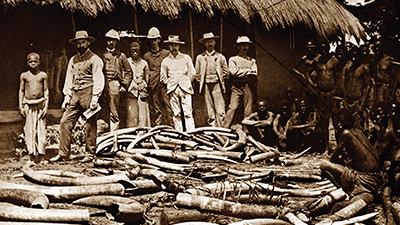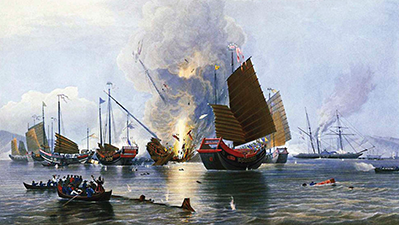Colonialism
Driving Question: What motivated colonialism, and what were the goals of colonial powers?
What really drives one country to control another? During the nineteenth century, colonial powers expanded with promises of trade and progress, but their goals often mixed ambition, economic manipulation, and political control.
Learning Objectives:
- Analyze the causes and consequences of colonialism in different societies around the world.
- Use the historical thinking practice of claim testing to identify, assess, and use authority when evaluating and making claims.
- Use the historical thinking practice of contextualization to analyze the conditions that led to the Opium Wars.
Vocab Terms:
- administrator
- colonialism
- ideology
- imperialism
- plantation
- profit
- subject
Opener: Colonialism
To teach this lesson step, refer to page 2 of the Lesson 5.3 Teaching Guide.
Try out using the Three-Step Reading with students to “read” visuals: First, get the big picture. Then, zoom in on details. Finally, think about what the image means. Our Reading Guide explains how to do this in more detail.
Start connecting industrial advances to imperialism by looking at how new technologies and economic systems gave empires more reach, control, and ambition.
Conquest and Control
To teach this lesson step, refer to page 3 of the Lesson 5.3 Teaching Guide.
For a refresher on Claim Testing, check out this one pager.
Imperial powers ruled their colonies through violence and coercion. Discover how that played out across the globe and use evidence to test claims about the realities of colonial rule.
-
Guiding Questions
-
Before you read
Preview the questions below, and then skim the article. Be sure to look at the section headings and any images.
While you read
Look for answers to these questions:
- How is Henry Morton Stanley’s journey in Africa described?
- Why was the early phase of colonialism especially violent?
- How did economic goals lead to violent practices in colonies?
- What ideas were used to justify the use of violence?
- What were some psychological effects of colonialism?
After you read
Respond to these questions: Do you think the suffering caused by colonialism outweighs any benefits? Why or why not?
The Opium Wars
To teach this lesson step, refer to page 8 of the Lesson 5.3 Teaching Guide.
Use the Contextualization Feedback Form to help students reflect and improve upon their contextualization skills.
The Opium Wars reflected the goals of imperial powers and the resistance they faced. These materials will help you place the conflict in context and examine how economics and empire were deeply connected.
-
Guiding Questions
-
Before you read
Preview the questions below, and then skim the article. Be sure to look at the section headings and any images.
While you read
Look for answers to these questions:
- What is economic imperialism, and why did some empires use it?
- Why was tea important in the relationship between Britain and China?
- What did Britain sell to China? How did the Chinese government respond?
- What caused the First Opium War?
- What were the “unequal treaties,” and what did they do?
After you read
Respond to this question: How might the history of the Opium Wars still influence global affairs today?
Closer: Colonialism
To teach this lesson step, refer to page 12 of the Lesson 5.3 Teaching Guide.
The Writing Guide is expansive and can help support students even with shorter writing tasks.
Can you take everything you’ve learned in this lesson and fit it into a pithy headline?
Writing: The Scramble for Africa
To teach this lesson step, refer to page 12 of the Lesson 5.3 Teaching Guide.
In this writing activity, you’ll use evidence from sources to support an argument that responds to the question: What were the major causes of the partition of Africa between 1880 and 1914 CE?
Perspectives on Power
To teach this lesson step, refer to page 13 of the Lesson 5.3 Teaching Guide.
Add depth to your understanding of imperialism by seeing how it was viewed differently across time and place. In the process, you'll explore how historical sources reflect bias, perspective, and lived experience.






